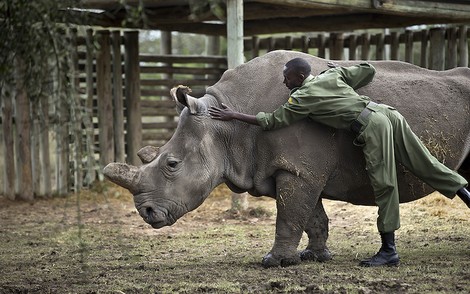Your podcast discovery platform
Curious minds select the most fascinating podcasts from around the world. Discover hand-piqd audio recommendations on your favorite topics.

piqer for: Global finds Doing Good
Michaela Haas, PhD, is the award-winning author of four non-fiction books, most recently Bouncing Forward: The Art and Science of Cultivating Resilience (Simon&Schuster). She is a member of the Solutions Journalism Network and writes a weekly solutions column for the German Süddeutsche Zeitung Magazin. Her articles have been published on CBS, the Washington Post, the Huffington Post, Daily Beast, and many other reputable media.
How Far Do We Go To Save A Species?
This spring, obituaries for the last male white northern rhino, named Sudan, dominated the front pages of international newspapers. Rarely does the death of a middle-aged bachelor elicit such desperate cries. “With great sadness” announced the safari park Ol Pejeta in Kenya the passing of its most famous resident who “stole the heart of many with his dignity and strength”. When “the charismatic animal” (New York Times) died, his caretakers “had been crying for days” (Time).
Before his guards put feeble Sudan to sleep at age 45 (an eternity in Rhino terms), a small army of bodyguards protected “the most eligible bachelor in the world” in his last years around the clock with machine guns.
But there is hope: I interviewed Thomas Hildebrandt, head of reproduction management at the Leibniz Institute for Zoo and Wildlife Research in Berlin and the leading world expert for the artificial insemination of mammals. In Nature Communications, he has just announced a huge breakthrough in his efforts to save the northern white rhinos: Together with an international team of researchers, he helped produce the first in vitro rhino embryo.
This is a vital step for his most challenging adventure yet: Soon he will fly to Kenya to extract eggs from the last two female northern white rhinos — an extremely risky, potentially life-threatening surgery for the two giants. Hildebrandt is confident that his team will manage to bring the species back from the brink of extinction through a combination of artificial insemination and progress in stem cell research. As he wryly jokes, he will either go down in history as the hero who saved the world's rarest large mammal — or as the idiot who accelerated its demise.
Stay up to date – with a newsletter from your channel on Doing Good.
